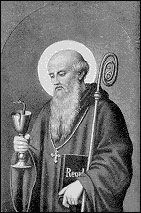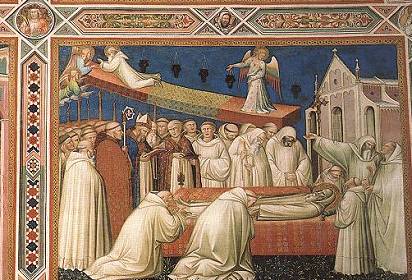
Home
Gregory XVII "Siri" The Pope in Red
The Coming Great Catholic Monarch
St. John Bosco's Dream (Vision) of Hell
Antichrist
(Catholic Prophecy)

The 1949 Edition
Translated by Rev. Boniface Verheyen, OSB
of St. Benedict's Abbey, Atchison, Kansas
| CHAPTER LXVI : Of the Porter of the Monastery |
The porter should have a cell near the door, that they who come may always find one present from whom they may obtain an answer. As soon as anyone knocketh or a poor person calleth, let him answer, "Thanks be to God," or invoke a blessing, and with the meekness of the fear of God let him return an answer speedily in the fervor of charity. If the porter hath need of assistance, let him have a younger brother.
If it can be done, the monastery should be so situated that all the necessaries, such as water, the mill, the garden, are enclosed, and the various arts may be plied inside of the monastery, so that there may be no need for the monks to go about outside, because it is not good for their souls. But we desire that this Rule be read quite often in the community, that none of the brethren may excuse himself of ignorance.
| CHAPTER LXVII : Of the Brethren Who Are Sent on a Journey |
On the day that the brethren return from the journey, let them lie prostrate on the floor of the oratory at all the Canonical Hours, when the Work of God is finished, and ask the prayers of all on account of failings, for fear that the sight of evil or the sound of frivolous speech should have surprised them on the way.
And let no one presume to relate to another what he hath seen or heard outside of the monastery, because it is most hurtful. But if anyone presume to do so, let him undergo the penalty of the Rule. In like manner let him be punished who shall presume to go beyond the enclosure of the monastery, or anywhere else, or to do anything, however little, without the order of the Abbot.
| CHAPTER LXVIII : If a Brother Is Commanded to Do Impossible Things |
| CHAPTER LXIX : That in the Monastery No One Presume to Defend Another |
| CHAPTER LXX : That No One Presume to Strike Another |
Let all, however, exercise diligent and watchful care over the discipline of children, until the age of fifteen; but even that, within due limits and with discretion. For if anyone should presume to chastise those of more advanced years, without the command of the Abbot, or should be unduly provoked with children, let him be subject to the discipline of the Rule; because it is written: "What thou dost not wish to be done to thee, do not thou to another" (Tb 4:16).
Continue to the...
|
| Return to top of page |
| Bookmark this site |

© StGemma.com Web Productions Inc. 2005-2011. All rights reserved.